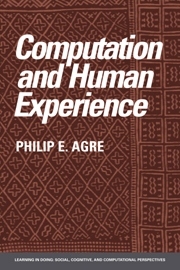Book contents
- Frontmatter
- Contents
- Preface
- 1 Introduction
- 2 Metaphor in practice
- 3 Machinery and dynamics
- 4 Abstraction and implementation
- 5 The digital abstraction
- 6 Dependency maintenance
- 7 Rule system
- 8 Planning and improvisation
- 9 Running arguments
- 10 Experiments with running arguments
- 11 Representation and indexicality
- 12 Deictic representation
- 13 Pengi
- 14 Conclusion
- Notes
- References
- Author index
- Subject index
10 - Experiments with running arguments
Published online by Cambridge University Press: 07 December 2009
- Frontmatter
- Contents
- Preface
- 1 Introduction
- 2 Metaphor in practice
- 3 Machinery and dynamics
- 4 Abstraction and implementation
- 5 The digital abstraction
- 6 Dependency maintenance
- 7 Rule system
- 8 Planning and improvisation
- 9 Running arguments
- 10 Experiments with running arguments
- 11 Representation and indexicality
- 12 Deictic representation
- 13 Pengi
- 14 Conclusion
- Notes
- References
- Author index
- Subject index
Summary
Motivation
This chapter demonstrates RA, the computer program introduced in Chapter 9 that illustrates the concept of running arguments. RA has three motivations, which might be reduced to slogans as follows:
It is best to know what you're doing. Plan execution – in the conventional sense, where plans are similar to computer programs and execution is a simple, mechanical process – is inflexible because individual actions are derived from the symbols in a plan, not from an understanding of the current situation. The device that constructed the plan once had a hypothetical understanding of why the prescribed action might turn out to be the right one, but that understanding is long gone. Flexible action in a world of contingency relies on an understanding of the current situation and its consequences.
You're continually redeciding what to do. Decisions about action typically depend on a large number of implicit or explicit premises about both the world and yourself. Since any one of those premises might change, it is important to keep your reasoning up to date. Each moment's actions should be based, to the greatest extent possible, on a fresh reasoning–through of the current situation.
All activity is mostly routine. Almost everything you do during the day is something you have done before. This is not to say that you switch back and forth between two modes, one for routine situations and one for the occasional novel situation. Even when something novel is happening, the vast majority of what you are doing is routine.
As a matter of computational modeling, all of this is more easily said than done. This chapter explains how RA instantiates these three ideals.
Information
- Type
- Chapter
- Information
- Computation and Human Experience , pp. 179 - 221Publisher: Cambridge University PressPrint publication year: 1997
